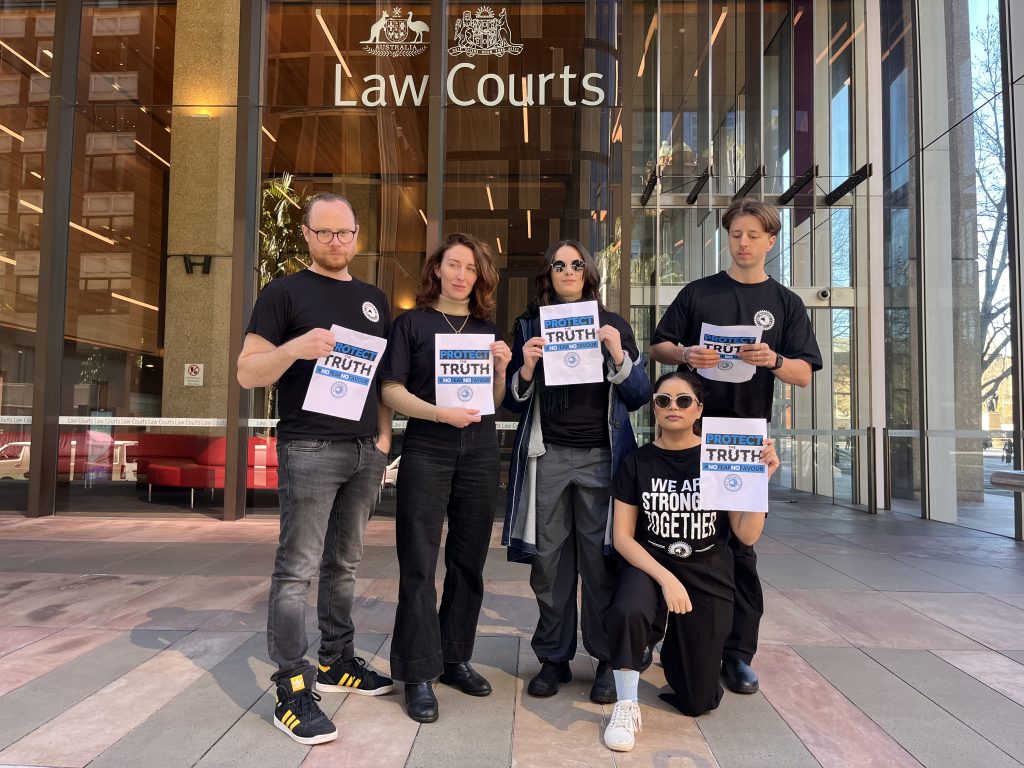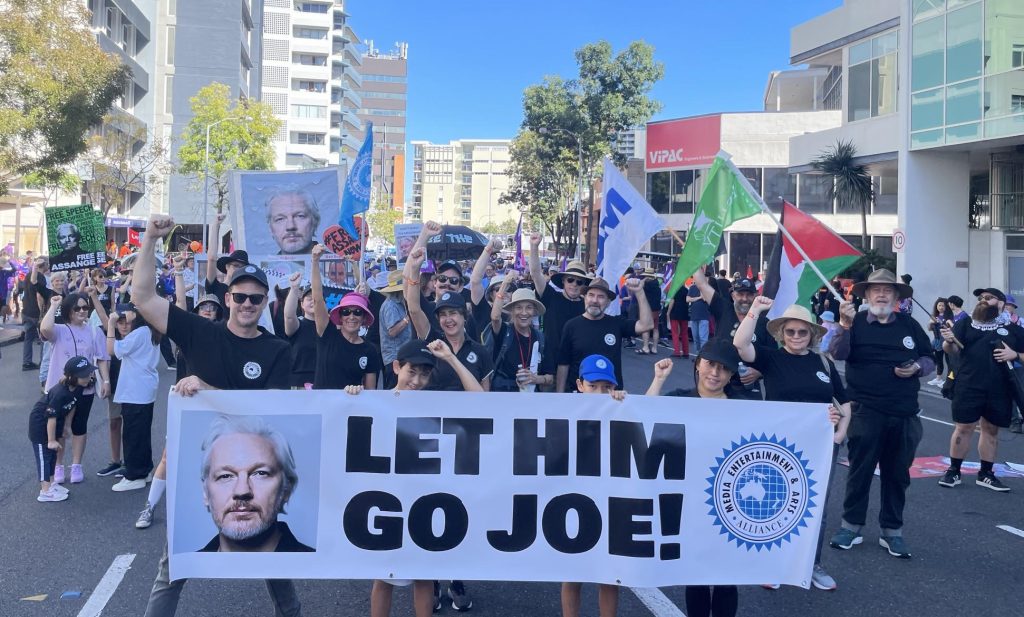2023-24 Media Section report
By Michelle Rae, Acting Director, MEAA Media
Members at the ABC cheered Antoinette Lattouf when she began unfair dismissal action against the broadcaster at the Federal Court in Sydney on June 25, 2024.
It has been my privilege to stand in as acting Director of MEAA’s Media section for most of 2024 while Cassie Derrick has been on parental leave. Cassie left the section in good shape as we geared up for a busy year of campaigning and bargaining at News Corp, Nine Publishing, Australian Community Media, Australian Associated Press, and in the freelance sector. We have amazing workplace leaders across the country, who volunteer their time to help their workmates.
Our objective is to build power for working journalists, from which we can grow a media industry that is independent, ethical, diverse, and appropriately resourced with good jobs to allow it to operate in the public interest, connect communities and challenge power.
We operate in a framework where digital disruption to advertising business models and the subsequent mass redundancies of the past decade have continued to shape the industry. The introduction of the News Media Bargaining Code in 2021 saw an increase of available funding to media outlets, specifically print media and public broadcasters. This funding, worth about $200 million, was due to be renewed in 2024. But the announcement by Meta early in 2024 that it would walk away from the funding agreements led to more than 266 job losses across the print industry in May and June.
The removal of Meta’s funding shows the lack of power within the Code and the need for real solutions in funding journalism. The business model that has been adopted by media companies of preserving shareholder returns by reducing costs through job cuts must be challenged. Media outlets need to prioritise the public’s right to know by investing in quality journalism.
Traditional organising and bargaining
After successfully securing a new enterprise agreement at the ABC in 2023, the focus of MEAA Media turned to bargaining at several other large sites in the 2023-24 financial year. These included News Corp, Nine Publishing, AAP and ACM.
Due to looming restructures and cost-saving measures, News Corp management was keen to avoid full enterprise bargaining this year. In May, members voted at union meetings across the nation to accept an offer from the company to roll over their EBA for 12 months with a pay rise of 3.5%.
At Nine Publishing, members were demanding a better than CPI wage increase, strong accountability in relation to diversity, consultation around ethical use of AI, and for the company to negotiate an agreement directly with freelance journalists. Members were angered when the company announced the loss of 70 to 90 print journalists’ jobs in the midst of negotiations in June, and passed a motion of no confidence in managing director Mike Sneesby, and began preparing for protected industrial action in pursuit of their claims.
ACM has more than a dozen separate EBAs covering different mastheads. Sites like the daily newspapers in Newcastle, Wollongong and Canberra have higher union density and have been able to force management to the table to negotiate. But in smaller sites where density has been lower, members have not received a pay rise for years and have struggled during a cost of living crisis. Warrnambool Standard members began negotiating an agreement in January but decided to roll over their conditions with annual pay increases of 3% backdated to August 2021. NSW regional dailies grew their membership to 70% after beginning negotiations in early 2024 and looked to lock in some improvements and pay rises.
Negotiations are also under way at AAP and Guardian Australia.
Industry campaigning
Industry campaigning seeks to go beyond the traditional workplace approach to unite MEAA members on issues that are confronted by media workers wherever and however they are employed. Industry campaigning allows us to show the community that our members are fighting for the public’s right to know and for quality journalism.
Artificial Intelligence, freelance conditions, diversity and ethical journalism are issues that impact on quality journalism.
The lack of cultural and linguistic diversity in Australia’s media is a well-known problem. Our newsrooms do not reflect and represent the diversity of the Australian community and this leads to poorer journalism and does a disservice to the public. MEAA members have been at the forefront of fighting for outlets to engage more journalists from diverse backgrounds and to build culturally safe workplaces. We are striving to include commitments to diverse employment practices, including annual gender and cultural diversity audits, in all of our collective agreements.
AI is an issue for all MEAA members, but in the Media section specific threats include journalists’ jobs being replaced by AI, their content being stolen by generative AI without consent or compensation, and the risks of AI being used to spread misinformation, disinformation and bias. We must hold employers to account by insisting that they provide ironclad commitments to ethical use of AI.
MEAA’s Journalist Code of Ethics is the gold standard in Australia, and is crucial to fostering future trust of journalism in this country. All employers must respect the Code, and the general public agrees with us. When the management of Australian Community Media sought to remove the Code from the Ballarat Courier EBA in 2023, we were able to build membership density there and, with the backing of hundreds of Ballarat residents who signed a petition to management, the Code was retained.
MEAA members marching in support of Julian Assange at the Brisbane Labour Day rally on May 6, 2024.
Solidarity with freelancers
One of the most heartening developments on the media landscape over the past 12 months has been the increased solidarity between in-house and freelance journalists.
The Charter of Freelance Rights was launched in 2022 as a mechanism to negotiate with media outlets for minimum standards for freelancer engagement, including rates of pay, timely payment, the Code of Ethics and dispute procedures. This has since been implemented at Private Media and Overland magazine.
Building on this, News Corp has included a reference to freelancers in their enterprise agreement and has committed to meet with freelancers at the insistence of MEAA in-house members. Similarly, a freelance claim was included in bargaining for the new enterprise agreement at Nine Publishing and at Guardian Australia.
Press freedom
The past 12 months have delivered a mixed bag on press freedom in Australia.
We rejoiced at the repatriation on Australian soil of Cheng Lei in October, and Julian Assange in June. In both cases, we have seen journalists used as pawns by two geopolitical superpowers, China and the United States. Cheng, a broadcast journalist whose family lives in Melbourne, had been detained by the Chinese government on undefined charges since August 2020. Assange’s detention in the UK was even longer: April this year marked five years since his arrest.
In both cases, MEAA joined with journalism and press freedom organisations around the world to keep up the pressure on both our own government and those of other countries for their freedom. The release of Julian Assange, a MEAA member since 2007, was particularly satisfying given the threat his case posed to journalists around the world.
But back at home, the Albanese Government is yet to act on a backlog of reforms including to national security laws, freedom of information, whistleblower protection and defamation. Australia slid from 27th to 39th on the Reporters Without Borders world press freedom index.
At the same time, journalists’ ability to do their jobs of informing the public has been undermined by media organisations who have kowtowed to external pressures.
This came to a head when broadcaster Antoinette Lattouf was sacked from a fill-in role on ABC local radio in Sydney shortly before Christmas, ostensibly for sharing a social media post by Human Rights Watch. In January, and again in March, MEAA members at the ABC passed motions of no confidence in their managing director, David Anderson, over the broadcaster’s handling of complaints about its journalists.
Well over 100 journalists have been killed in Gaza since the Israel-Hamas conflict began in October 2023. MEAA joined the call of the International Federation of Journalists for Israel to abide by international law and not target journalists, and, in response to the urgent need for basic provisions, Australian journalists raised almost $17,000 for our colleagues in Gaza through an appeal co-ordinated by the Media Safety & Solidarity Fund.

